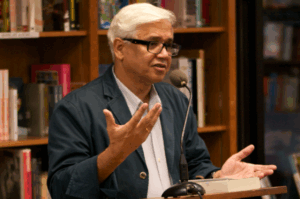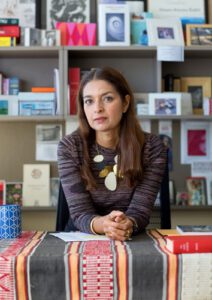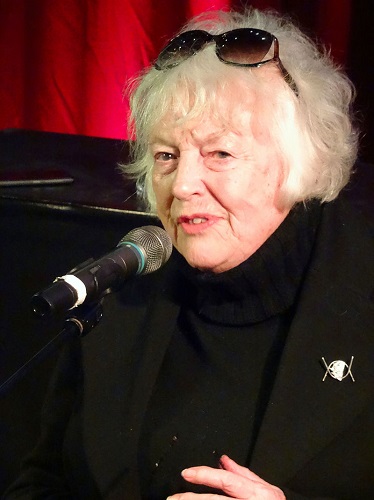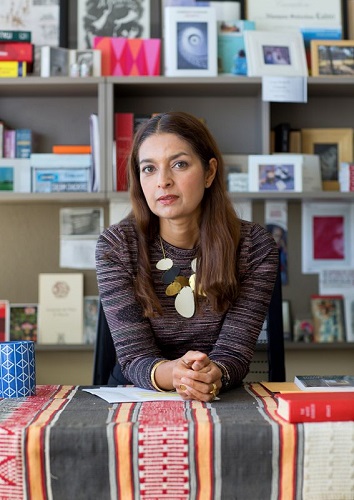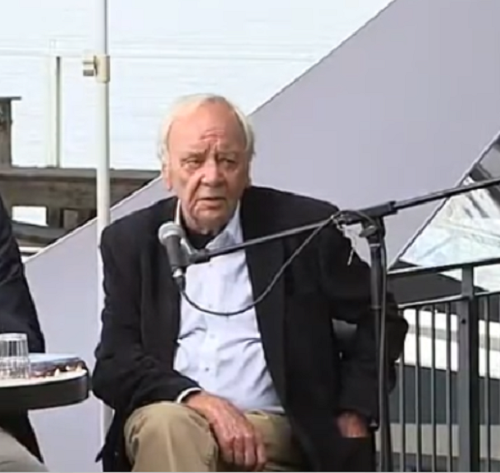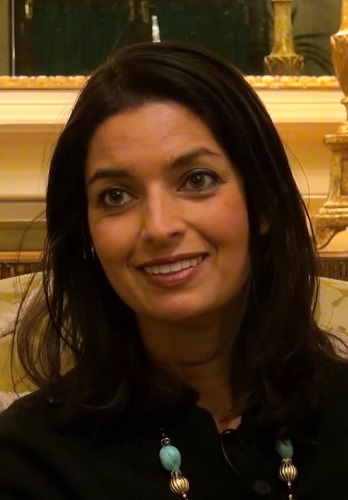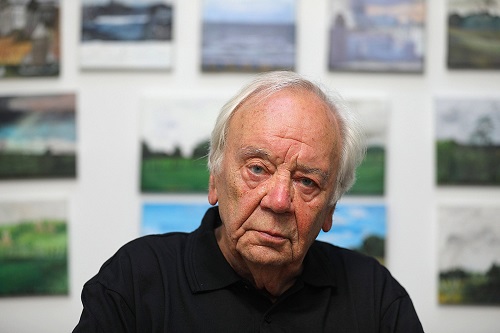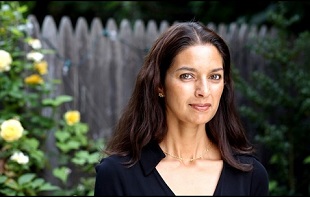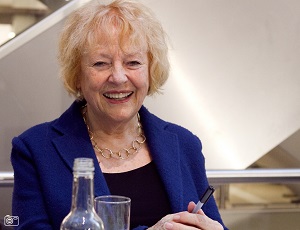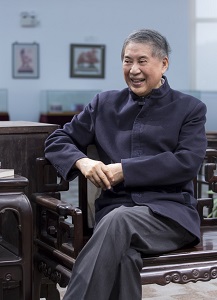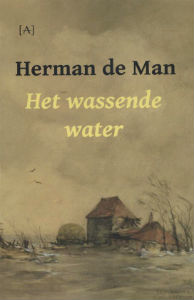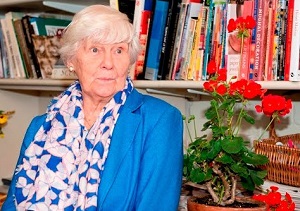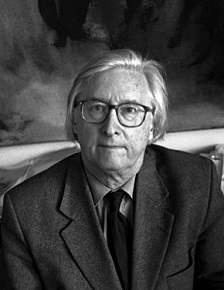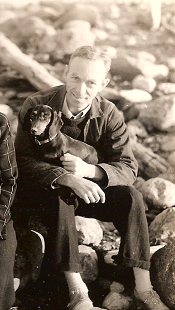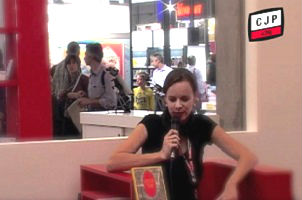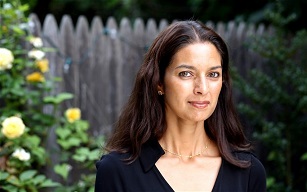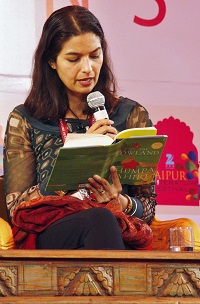De Amerikaanse schrijfster Jhumpa Lahiri Vourvoulias werd geboren op 11 juli 1967 in Londen. Zie ook alle tags voor Jhumpa Lahiri op dit blog.
Uit: The Clothing of Books
“In the house of my father’s family in Calcutta, which I visited as a child, I would watch my cousins getting dressed in the mornings. They got themselves ready for school; I, on the other hand, was on vacation. They donned every morning, after bathing and before having breakfast, the same thing: a uniform.
My cousins attended different schools and therefore their respective uniforms were also different. My male cousin wore navy blue cotton pants. My female cousin, a few years older, wore a sky-blue skirt. Apart from these two colors, and the yellow tie my male cousin had to knot around his collar, the rest of the uniform was identical: a white short-sleeved shirt, white socks, black shoes.
In the closet there were surely two pairs of navy pants, two sky-blue skirts. It was enough to put on what was cleaned and pressed. In America, before leaving for India, my mother would buy several pairs of white socks, knowing that my aunt would be grateful for them.
However simple and functional, I found my cousins’ uniforms splendid, fascinating. On the street, on buses and trams, I was struck by this visual language, thanks to which one could identify and classify thousands of students in such a large and populous city. Every uniform represented belonging to one school or another. Each of my peers in Calcutta enjoyed, to my eyes, a strong identity and, at the same time, a sort of anonymity. This is the effect of the uniform.
I would have liked a uniform myself. Whenever I would go to the seamstress to be fitted for new clothes—a particular adventure I could experience only in India, where, in the 1970s, it was still common to wear handmade garments instead of buying one’s clothing in stores—I was tempted to ask for one. It was a foolish desire on my part. Apparel of this kind would have been of no use for me. In America I attended public school, where everyone wore what they wanted. And I was tormented by this choice, by this freedom.
When I was a child, expressing myself through clothing was a source of anguish. I already felt different, conspicuous because of my name, my family, my appearance. In all other respects, I wanted to be just like everybody else. I dreamt of sameness, even invisibility. Instead, forced to find my own style, I felt badly dressed, the exception rather than the rule.”

Jhumpa Lahiri (Londen, 11 juli 1967)
De Nederlandse schrijfster en coumniste Marjan Berk werd geboren op 11 juli 1932 in Zeist als Marie-Janne van Baaren. Zie ook alle tags voor Marjan Berk op dit blog.
Uit: Hollands Dagboek
“Nacht van woensdag [5] op donderdag [6 oktobe 1983r]
Ondanks de smartiekleurige pijnstillers, de verrukkelijke valium-tabletten die de zorgzame en bovenal begrijpende dokter V. heeft voorgeschreven, wil de slaap niet komen. We laten alles nog eens de revue passeren, de synopsis opdracht van de CPNB om iets aardigs te bedenken voor de opening van de kinderboekenweek, het enthousiasme hierover, de onvoorstelbare tilkracht van Marijke Gelderman, die uit budgettaire overwegingen ging lobbyen bij de omroepen en uiteindelijk de KRO bereid vond mee te doen, zodat het budget rond kwam. Toen het schrijven, een opwindend karwei, samen met mijn wettige echtgenoot dag en nacht kibbelen, zingen, stampvoetende dansjes uitvoeren, duizend keer roepen: ‘Godverdomme, waarom begrijp je nou toch niet wat ik bedoel!’, en af en toe de vonk voelen overslaan, zo ongeveer alsof er een nieuwe bougie in je auto wordt gezet! Dan het moment van voorlezen en voorzingen aan de opdrachtgevers, de muziek sloeg aan, men zong al mee, het kind was geboren, nu de nazorg! De muziek werd opgenomen, buitengewoon deskundig door Eddie Hilberts, een echte popspecialist, door de muzikanten van de Rob de Nijs-band. Jongens die fantastisch op elkaar zijn ingespeeld zodat de sound nèt even dat extra heeft watje met een dagje studiomuzikanten niet haalt, ook al zijn ze nog zo goed.
Op de twee heetste dagen van de eeuw zongen de zestien, op persoonlijkheid en stemkwaliteit geselecteerde kinderen met grote lust en energie de liedjes in. Je mag wel zeggen, dat ze zich uitleefden. Het was feest, weliswaar een beetje een slopend feest, maar aanstekelijk. De banden voor tv, grammofoonplaat en zaaluitvoering behoefden veel nazorg. Het was een klus, maar het resultaat stemde tot tevredenheid. De hemelbaby’s, zoals de cast in de wandeling al werd genoemd, kregen de bandjes mee met vakantie. Begin september zouden de repetities beginnen.’
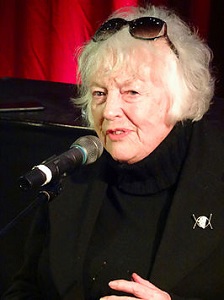
Marjan Berk (Zeist, 11 juli 1932)
De Taiwanees-Amerikaanse schrijver Pai Hsien-yung werd geboren op 11 juli 1937 in Guilin, Guangxi in China. Zie ook alle tags voor Pai Hsien-yung oo dit blog.
Uit: Winter Nights (Vertaald door John Kwan-Terry en Stephen Lacey)
“In Taipei, winter nights are usually cold and wet. A chill gust of wind was blowing again this evening and then, without warning, the rain fell, pitter-pattering onto the pavements. The alleys around Wen-chou Street already were under more than an inch of water. Professor Yii Chin-lei made his way to the entrance of the alley where he lived, and looked around. On his feet were a pair of wooden clogs and he held a torn, old-fashioned umbrella made of oil-paper; through the gaping hole the raindrops dribbled down onto his bald head. He was wrapped in his customary thick, pad-ded gown, but even this was no protection against the bone-chilling cold of a Taipei winter night. He hunched his shoulders and shivered. The alley was shrouded in a hazy gray mist. Not a shadow of a creature could be seen anywhere. The heavy silence was broken only by the sound of the rain which fell like a faint shower of fine-grain sand on the tiled roofs of the low houses that stretched far and near. Professor Yii stood stiffly in the cold rain, his two hands propping up the torn umbrella. After a while, he turned around and plodded back to his house in the alley. He was lame in his right leg, and in his clogs he shuffled along very awkwardly, his body jerking to one side at every step. The house which Professor Yii made his shelter looked exactly the same as the other University quarters in the alley, old build-ings that had survived the Japanese Occupation. It bore all the scars of long neglect. The eaves, door, and windows were moul-dering from decay and disrepair. The sitting-room floor was still covered with tatami mats, heavy with years of dampness. They emitted a faint odor of rotting straw that hung in the air at all times of the day. The sitting-room itself was simply furnished: a desk, a tea-table, a pair of tattered armchairs so worn with age that the cotton padding was hanging out of the burst seams. Books were chaotically strewn about the desk, chairs, and tatami mats. These were books in hard covers once, but the binding had come off some, mold had eaten into others, and many were scattered about like so many disembodied corpses with missing heads and limbs. Incongruously entangled in the confusion were a few storybooks of knight errantry bound in brown paper and rented from neigh-borhood bookshops. »

Pai Hsien-yung (Guilin, 11 juli 1937)
De Nederlandse schrijver Herman de Man (eig. Salomon Herman (Sal) Hamburger) werd geboren in Woerden op 11 juli 1898. Zie ook alle tags voor Herman de Man op dit blog.
Uit: Het wassende water
“Zijn weeuw orf voor de keinders wèl de honderd en tien bunders best koepolderland, maar niet de waardigheid. Notaris Bestebroer wier Heemraad en later wier haar gebuur, manke Janus Maaien, in Rijk zijn steê gekozen in den Raad. Alhoewel ze dâlijk bezien had, dat het zóó beuren zou, knaagde dat aan heur hart. Want vrouw Beijen was een machtig vierkant wijf, stram gezeggend als een man en niet min parmantig. Zelf reed ze ter markt met den groenen bolderwagen, ze beklonk eigens groote koopen en bezocht de pachtvenduties bij de Notarissen in de stad. Vurige zweepharde ruinen mende ze als een vent. Ze bestierde gewisselijk het land en de doening daarop, wees de tijen aan voor ’t staalkeeren en het maaien, voor uitzaai en oogst, voor appelenplok en beetenrooi… ’t is niet te veel gezeid… vrouw Beijen van Water-Snoodt was wijf en baas beiden, ze liet heur mans bedrijf niet steken in den mist, bij lange niet.
Maar kon ze heur rokken op de til hangen en haar eigen in de broek steken? Ze stond ommers voorgoed als vrommes op de secretarie ingeschreven.
Dus wier ze, naar de vaste manier is, in poldernoch gemeentebestuur verkozen. En al ging van den huize Water-Snoodt, een van de rijkste boerendoeningen uit de Lopikerwaard, een macht uit door ’n elk gevoeld, in geen enkel collegie wier meer het woord der Beijens vernomen. Daarom moet niet gedocht worden: – Water-Snoodt heeft zijn glorie gehad – want het goed gedijde, drie mannemenschen, sterke jongens van den huize, wrochtten dag aan dag op het land gelijk de knechten doen, en het eenigst fleurig meidje, moeders jongste, leerde al wringen en kernen. De vrouw was door de zware jaren heen met heur jonkvolk. Toen Rijk ’t begaf, gongen er enkele nog ter school; nu was Wieleke bevestigd, de jongens al eer. Er zat schot in dat volk van Water-Snoodt. Het wieren lange mannen, rechtzinnige boeren en Wieleke een bekwaam en pront en lief dochtertje. Ze verstonden allen moeders, weinig malen behoefde er onmin te zijn op de groote woning.
Als de vrouw ernstig op het verhoog van de deel zat en aarpels schilde, dan overkeek ze gansch de doening. Het fijne figuurtje van heur Wieleke, ’t haar zedig onder de eerste kanten mutse, zag ze gaan en keeren: van den huis naar ’t boenhok, van ’t boenhok weerom naar de deel. Het zuivelgerief blonk er in heur handen, het ijzer van de kuipen was als gepolijst zilver. De handen van dat werksche meidje stonden recht, ze aardde heur moeder, al was ze teêrder.”
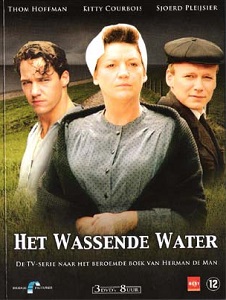
Herman de Man (11 juli 1898 – 14 november 1946)
Cover DVD
De Duitse dichter en schrijver Helmut Krausser werd geboren op 11 juli 1964 in Esslingen am Neckar. Zie ook alle tags voor Helmut Kraussner op dit blog.
Uit: Eros
„Ohne viel von ihm zu wissen, außer dem wenigen, was es hier und da zu lesen gab, und ohne ihn je gesehen zu haben, außer auf schon angegilbten Fotografien, war er mir widerlich. Dennoch reiste ich an, als er mich rief. Wer meiner Kollegen wäre seinem Ruf nicht gefolgt? Alle, ausnahmslos alle hätten sie ihre Neugier gestillt.
Auf der Zugfahrt, die mich zu ihm brachte, war ich ein Mann in zerrütteten Verhältnissen, der einen Mann von sagenhaftem Reichtum besuchen würde, zu einem mir unbekannten Zweck.
Unterlassen Sie die kleinlichen Fragen. Kommen Sie, schrieb er, Sie werden es nicht bereuen, versprochen.
In dieser Formulierung lag Arroganz und Magie. Mir graute vor der Faszination, die sein scheinbar großmäuliges Versprechen auf mich ausübte. Ich schwor, mich nicht kaufen zu lassen, zu keinem Preis – und wußte im selben Moment, daß, wer solche Schwüre leistet, die drohende Gefahr nicht nur spürt, sondern ihr entgegeneilt. Mit der Verlockung ein wenig zu spielen, ja, das nimmt man sich vor. Ein Angebot, gleich welcher Art, zu erhoffen, zu prüfen, schon um Geltungsdrang und Eitelkeit zu füttern, auch dies erlaubt man sich im voraus. Sich aber vorzunehmen, dann, danach, standhaft zu bleiben, grenzt bereits an Selbstbetrug.Diese Sätze schrieb ich in mein Notizbuch, während grauer, aufgewirbelter Schnee die Fenster des Abteils erblinden ließ.
Das letzte Foto, das Alexander von Brücken zeigte, war vor mehr als zwanzig Jahren entstanden. Seither schien es niemandem gelungen zu sein, ihn vor das Objektiv einer Kamera zu bekommen. Es hieß, er lebe zurückgezogen auf seinem Schloß im südlichen Oberbayern, umgeben von wenigen Bediensteten.
Das stürmische Winterwetter steigerte meine Furcht vor ihm und vor mir selbst. Auf dem winzigen Provinzbahnhof angekommen, suchte ich vergeblich nach einem Kiosk, um irgendetwas zu kaufen, vielleicht einen Schnaps.“
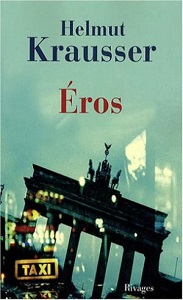
Helmut Krausser (Esslingen am Neckar, 11 juli 1964)
Cover
De Engelse schrijfster Jane Mary Gardam werd als Jane Pearson geboren op 11 juli 1928 in Coatham, North Yorkshire. Zie ook alle tags voor Jane Gardam op dit blog.
Uit: Old Filth
« He was spectacularly clean. You might say ostentatiously clean. His ancient fingernails were rimmed with purest white. The few still-gold hairs below his knuckles looked always freshly shampooed, as did his curly still-bronze hair. His shoes shone like conkers. His clothes were always freshly pressed. He had the elegance of the 1920s, for his garments, whatever they looked like off, always became him. Always a Victorian silk handkerchief in the breast pocket. Always yellow cotton or silk socks from Harrods; and some still-perfect from his old days in the East. His skin was clear and, in a poor light, young.
His colleagues at the Bar called him Filth, but not out of irony. It was because he was considered to be the source of the old joke, Failed In London Try Hong Kong. It was said that he had fled the London Bar, very young, very poor, on a sudden whim just after the War, and had done magnificently well in Hong Kong from the start. Being a modest man, they said, he had called himself a parvenu, a fraud, a carefree spirit.
Filth in fact was no great maker of jokes, was not at all modest about his work and seldom, except in great extremity, went in for whims. He was loved, however, admired, laughed at kindly and still much discussed many years after retirement.
Now, nearing eighty, he lived alone in Dorset. His wife Betty was dead but he often prattled on to her around the house. Astonishingly in one so old, his curly hair was not yet grey. His eyes and mind alert, he was a delightful man. He had always been thought so. A man whose distinguished life had run steadily and happily. There was no smell of old age about his house. He was rich and took for granted that it (and he) would be kept clean, fed and laundered by servants as it had always been. He knew how to treat servants and they stayed for years.
Betty had been successful with servants, too. Both she and Old Filth had been born in what Americans called the Orient and the British Raj had called the Far East. They knew who they were, but they were unselfconscious and popular.
After Betty’s death the self-mockery dwindled in Old Filth. His life exploded. He became more ponderous. He began, at first slowly, to flick open shutters on the past that he had, as a sensible man with sensible and learned friends (he was a QC and had been a judge), kept clamped down.”
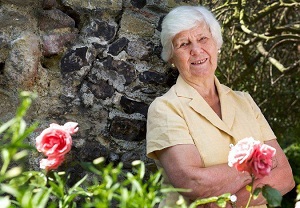
Jane Gardam (Coatham, 11 juli 1928)
De Franse schrijver Henri Coulonges werd geboren op 11 juli 1936 in Deauville. Zie ook alle tags voor Hneri Coulonges op dit blog.
Uit: La Marche hongroise
« Alors elle a fondu en larmes sans pouvoir s’arrêter, raconta Dolly. Une vraie crise de nerfs. – Je ne comprends pas pourquoi! s’étonna Vincent. Recevoir un bouquet de fleurs n’est pas si déplaisant… » A l’expression qu’avait prise Dolly, il comprit qu’elle venait de faire se provision de ragots dans les rubriques spécialisées des journaux, et qu’elle tenait à le faire profiter sans plus attendre de sa moisson toute fraîche. « Figure-toi que Lana et son ami, comment s’appelait-il déjà, Greg quelque chose, avaient conclu une sorte de pacte. Si l’un des deux venait à se lasser de l’autre, il – ou elle – devait lui adresser une douzaine de roses rouges, sans autre message. Cela signifiait : tout est fini entre nous. Eh bien, quand Greg est parti pour New York… – J’ai compris la suite, ce qui prouve que ce n’est pas un bon scénario, l’interrompit Vincent. – Raconte, puisque tu es si malin, dit-elle d’un ton agacé. – Dolly, tu oublies que j’ai l’ambition d’être un jour réalisateur ! Sur une situation de départ de ce type, je peux te servir ce que tu désires, du drame ou du vaudeville, un rôle pour Cary. Grant ou un pour Oliver Hardy. » Elle ne put s’empêcher de rire. « … Que je te raconte la fin, tout de même : Greg avait demandé au fleuriste d’adresser à Lana Tuner des roses blanches et elle en avait reçu des rouges. – Quelle terrible confusion ! Tu imagines les conséquences ? La malheureuse Lana en larmes, et qui plus est réduite à la chasteté, peut-être des nuits durant… – Tu ne peux donc jamais être sérieux ? Tu devrais pourtant essayer de temps à autre… J’ai eu vent qu’entre Judy et toi ce n’est plus tellement l’époque des roses, qu’elles soient rouges ou blanches!.”
Vincent prit un air surpris. « Quoi, c’est aussi dans Variety? » Dolly haussa les épaules. « Bon, fit-il en changeant de ton, tu as raison. Pour reprendre ton histoire, j’aurais dû depuis longtemps envoyer des roses rouges à Judy. Mais elle ne connaissait sans doute pas le code de Miss Diluer. – A vrai dire, c’est elle que je ne comprends pas dans cette affaire, lança Dolly. Elle avait cette chance de t’avoir sous son toit, et voilà qu’elle te met dehors. » Elle prononça le mot avec un tel accent que leurs voisins se retournèrent sur eux. « Ce n’est peut-être pas nécessaire de mettre toute la cantine au courant de mes déboires conjugaux, murmura-t-il. Par qui l’as-tu appris?.”

Henri Coulonges (Deauville, 11 juli 1936)
Deauville
De Amerikaanse schrijver publicist, essayist Elwyn Brooks (E.B.) White werd op 11 juli 1899 geboren in Mount Vernon, New York. Zie ook alle tags voor E. B. White op dit blog.
Uit: Here is New York
“….Mass hysteria is a terrible force, yet New Yorkers seems always to escape it by some tiny margin: they sit in stalled subways without claustrophobia, they extricate themselves from panic situations by some lucky wisecrack, they meet confusion and congestion with patience and grit—a sort of perpetual muddling through. Every facility is inadequate—the hospitals and schools and playgrounds are overcrowded, the express highways are feverish, the unimproved highways and bridges are bottlenecks; there is not enough air and not enough light, and there is usually either too much heat or too little. But the city makes up for its hazards and deficiencies by supplying its citizens with massive doses of a supplementary vitamin—the sense of belonging to something unique, cosmopolitan, mighty and unparalleled.Manhattan has been compelled to expand skyward because of the absence of any other direction in which to grow. This, more than any other thing, is responsible for its physical majesty. It is to the nation what the white church spire is to the village—the visible symbol of aspiration and faith, the white plume saying that the way is up. The summer traveler swings in over Hell Gate Bridge and from the window of his sleeping car as it glides above the pigeon lofts and back yards of Queens looks southwest to where the morning light first strikes the steel peaks of midtown, and he sees its upward thrust unmistakable: the great walls and towers rising, the smoke rising, the heat not yet rising, the hopes and ferments of so many awakening millions rising—this vigorous spear that presses heaven hard. New York is nothing like Paris; it is nothing like London; and it is not Spokane multiplied by sixty, or Detroit multiplied by four. It is by all odds the loftiest of cities…”
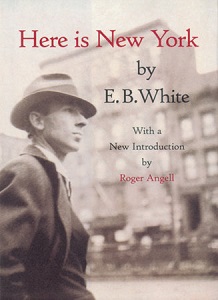
E.B. White (11 juli 1899 – 1 oktober 1985)
Cover
Onafhankelijk van geboortedata
De Vlaamse schrijfster Ann De Craemer werd geboren in Tielt in 1981. Zie ook alle tags voor Ann De Craemer op dit blog.
Uit: Vurige tong
“Het was tien voor drie geworden. Jezus leefde nog net, dus tijd om de spanning wat op te drijven. Juffrouw Lieve stapte naar voren en wist wat haar te doen stond. Ze legde haar bijbel zachtjes op de lessenaar neer en begon met gedempte stem voor te lezen. Ze verdween bijna in haar rol. Het scheelde niet veel of niet alleen het voorhangsel van de tempel zou straks in tweeën scheuren, maar ook het tranenreservoir van juf Lieve.
‘Vanaf het zesde uur viel er een duisternis over het hele land, tot aan het negende uur. Omstreeks het negende uur riep Jezus met luide stem uit: ‘Eli, Eli, lema sabaktani?’ dat wil zeggen: ‘‘Mijn God, mijn God, waarom hebt Gij Mij verlaten?”’
‘Eli, Eli, lema sabaktani’. Ik sidderde van genot bij het horen van die exotische woorden. Ik zag de donkere hemel boven de berg van Golgotha voor mij, het bloed, de spons, het zweet en de tranen, de verzengende liefde van Maria Magdalena en de twee misdadigers aan het kruis naast Jezus. Het was een spannend verhaal waar ik nog steeds van smulde. In het tweede leerjaar had ik drie keer op rij net dat deel van de kinderbijbel uit de bibliotheek van Tielt geleend waarin Jezus stierf aan het kruis. Mijn vader had het na een tijdje genoeg gevonden en gezegd dat hij zich schaamde om samen met mij aan de balie steeds datzelfde boek terug te brengen. Het boek bleef daarna in de bibliotheek, maar toch ging ik er af en toe stiekem even in bladeren en liet ik me volledig opslorpen door de overrompelende tekeningen van de stervende Jezus aan het kruis.
Juf Lieve ging verder met lezen. In de kapel en ook even in mijn verbeelding werd het duisterder. ‘Enkelen uit de omstanders die het hoorden, zeiden: “Hij roept om Elia!” Onmiddellijk daarop ging een van hen een spons halen, drenkte die in zure wijn, stak ze op een rietstok en bood Hem te drinken. Maar de anderen zeiden: “Laat dat! Wij willen eens zien of Elia hem komt redden.” Jezus slaakte andermaal een luide kreet en gaf de geest.’
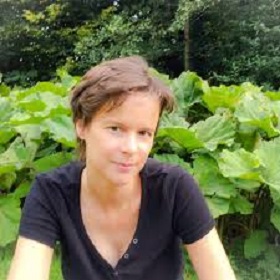
Ann De Craemer (Tielt, 1981)
Zie voor nog meer schrijvers van de 11e juli ook mijn blog van 11 juli 2016 en ook mijn blog van 11 juli 2015 deel 1 en ook deel 2.
